Dunkin' has now gone to the dark side; they’re selling Pepsi products now in my area.
🎵 My 13yo son is on an 80s music kick and I couldn’t be more proud.
🍿 Ant-Man and the Wasp: Quantumania this afternoon with Amber. Fun movie, about on par with the rest of this phase of Marvel films. I do think they are setting things up for a potentially great final act!

🍿 Introduced Ang Lee’s Hulk to my son today. We agreed that it holds up well as a thoughtful and character-driven superhero film. We loved the visual style that really sought to capture the feel of a horror comic.

St. Paul said,
“…the free gift is not like the trespass. For if many died through one man’s trespass, much more have the grace of God and the free gift by the grace of that one man Jesus Christ abounded for many.” (Romans 5:15, ESV)
Adam’s sin spread to every human because the fundamental relationships between humans were irreparably broken in that instance. We fell down a hole that we could not dig ourselves out of.
Christ’s salvation spreads to every human because his act of forgiveness does the exact opposite. As we simply trust in Christ, he empowers and energizes every person to follow him in forgiveness in the Spirit.
Humanity is being healed and hauled out of the graves we have dug for ourselves.
“Therefore, as one trespass led to condemnation for all men, so one act of righteousness leads to justification and life for all men.” (Romans 5:18, ESV)
Thanks be to God!
The foolishness of the Cross of Christ
To be honest, many people do misunderstand the cross, and think of it as some kind of divine child abuse, as if the suffering of Christ in itself instead of the compassion of Christ in and through suffering is what pleases God.
Yet even when framed correctly, as the act of self-sacrifice, love, forgiveness, and redemption that it is, it remains “… a stumbling block to Jews and folly to Gentiles,” (1 Corinthians 1:23, ESV)
Why? I think because story of the Cross told simply and faithfully is a story about humanity’s inability to save ourselves, to lift ourselves completely out of our worst tendencies. The story of the Cross says everyone needs to be taught and transformed in order to live. The story of Cross says human beings don’t know how to live apart from God, because it is impossible to live apart from God. The story of Cross says all the wisdom of humanity is nothing compared to one simple and perfect act of divine love.
God’s ways have always been simple: “He has told you, O man, what is good; and what does the LORD require of you but to do justice, and to love kindness, and to walk humbly with your God?” (Micah 6:8, ESV)
We can do a lot as human beings: we can go to space, cure many diseases, discover much of the world and build all kinds of great wonders, but what we can’t seem to do without help is live in harmony with God and each other. The world still seems awfully short on justice, often unwilling to consider kindness, and wondering what humility really is. We cannot overpower the sin that leads to death.
How are we to even know what justice and love and kindness and walking humbly in the ways of God even means?
Quite simply, we can look to Christ, because Christ is the wisdom of God for us. This means not only does he teach the wisdom of God for our benefit, he lives out the wisdom of God for our salvation.
God, come to us as one of us in Christ Jesus, chooses the way of humble forgiveness to be the way of salvation. And his way is vindicated by his Resurrection in the power of the Holy Spirit.
We can hardly grasp that this is the way that God would save the world, yet we now know that perfect love expressed in forgiveness for sinners is the antidote to sin, an antidote only God himself could manifest, that only God himself could administer.
This post is based on a sermon I preached.
Photo by Josh Applegate on Unsplash
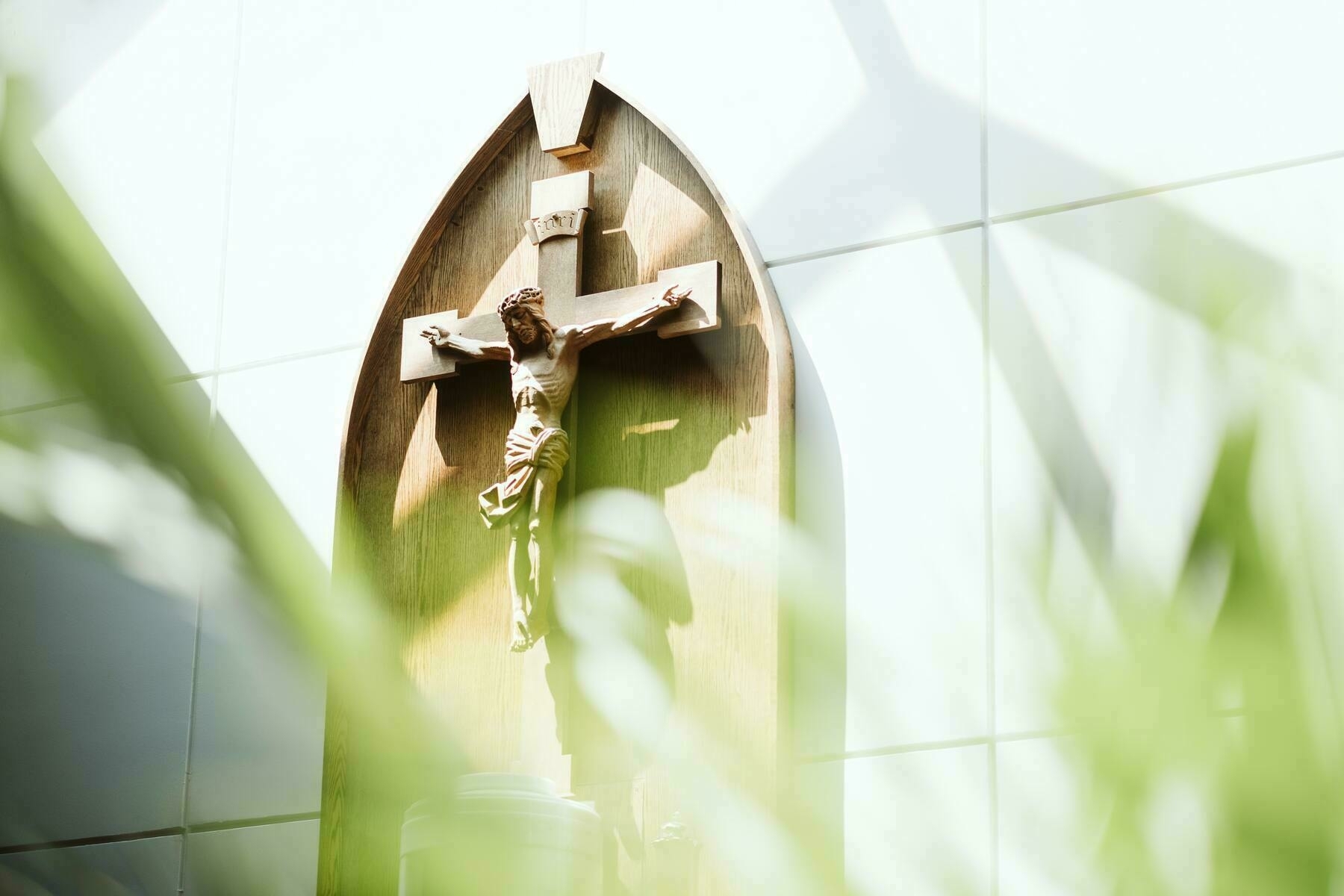
Psalm 67
Deus misereatur
1
May God be merciful unto us, and bless us, *
and show us the light of his countenance, and be merciful unto us.
2
Let your way be known upon earth, *
your saving health among all nations.
3
Let the peoples praise you, O God; *
indeed, let all the peoples praise you.
4
O let the nations rejoice and be glad, *
for you shall judge the peoples righteously, and govern the nations upon earth.
5
Let the peoples praise you, O God; *
let all the peoples praise you.
6
Then shall the earth bring forth her increase, *
and God, even our own God, shall give us his blessing.
7
God shall bless us, *
and all the ends of the world shall fear him.
The New Coverdale Psalter
Saturday morning at home.
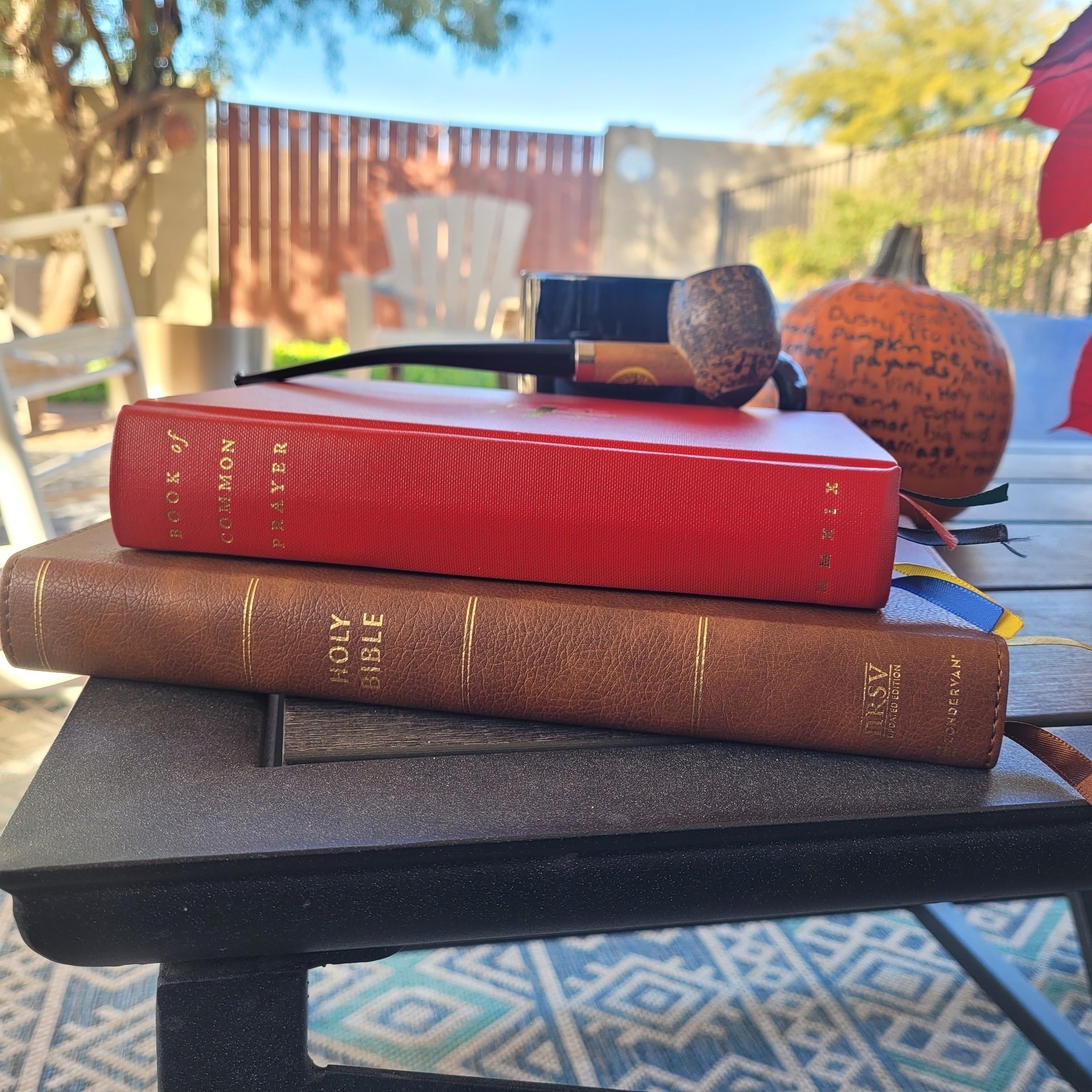
I told ChatGPT: Write a short prayer for Christian unity in the style of the Book of Common Prayer, 1662.
Result: O merciful God, who hast taught us in thy holy Word, that thou dost not delight in division, but in the unity of thy Church: grant, we beseech thee, unto thy whole Church in paradise and on earth, that, being all joined together in the same faith and in the same love, they may be united in heart and in soul, and may be one, as thou and thy Son Jesus Christ are one; who with thee and the Holy Ghost liveth and reigneth, one God, world without end. Amen.
Christ is the Mountain
Isaiah casts a breathtaking vision for the inevitable future that awaits us.
“He shall judge between the nations, and shall decide disputes for many peoples; and they shall beat their swords into plowshares, and their spears into pruning hooks; nation shall not lift up sword against nation, neither shall they learn war anymore.” (Isaiah 2:4, ESV)
Isaiah sees a world in which people, tired of violence and war, finally admit they are walking in darkness, that they don’t know how to move forward in the way that leads to life. In this vision, all come to the mountain of the Lord, where they finally learn how to be at peace and literally cultivate life in light of the truth of the ways of God.
It’s not as if God has ever not been teaching the world, how to live, though!
He has sent many prophets (see: the Bible).
It’s just that because of our tendency toward selfishness and self-destructiveness in our attitudes, actions, and affections, we irrationally ignore God’s life-giving word and do our own thing—even when our own thing leads to death.
This is what Jesus is talking about in Matthew:
“For as were the days of Noah, so will be the coming of the Son of Man. For as in those days before the flood they were eating and drinking, marrying and giving in marriage, until the day when Noah entered the ark, and they were unaware until the flood came and swept them all away, so will be the coming of the Son of Man.” (Matthew 24:37–39, ESV)
There’s nothing wrong with eating and drinking, marrying and giving in marriage, but the point was they did not at all change their way of life in light of what was going to happen, in light of what God was speaking to them.
Because of this, they were swept away, and quite literally missed the boat of God’s blessing and protection.
This could be any of us, at any time, if we are not careful, and if we continue to wander in the darkness of our own selfish confusion, and our self-destructive desires.
But God has not left the nations to walk in darkness. He sent us the light of his Son, Jesus Christ. He is the light, and he is the mountain where the good judgements of God take place.
St. Augustine said,
“Approach the mountain, climb up the mountain, and you that climb it, do not go down…There you will be safe, there you will be protected; Christ is your mountain of refuge ”
In his life, we see light, and we understand how to live. In his death on the cross, he condemned sin in the flesh by demonstrating the power of truly self-less love. By his Resurrection, he scatters the darkness from before our path and offers us a share in his eternal life now and forever by his Holy Spirit.
This is public knowledge!
Christ’s work is ours to receive freely by faith, and ours to share freely in word and deed with the world as we wait for all to recognize their need for mercy.
Photo by Cosmic Timetraveler on Unsplash

King of Forgiveness
Even the people of God can’t govern themselves in such a way that provides for the flourishing of the community. This is because all people, including the people that God calls to himself, are infected by their own selfish and self-destructive attitudes, actions, and affections.
So even when we try to rule with the best of intentions, the most thoughtful checks and balances, the best statements of human rights, we get all twisted up in our own way. Fear, greed, and pride lead to violence, war, and death. Every time. Every purely human empire falls eventually.
So, God promises steps in to rule directly. He will appoint leaders. He will raise up a human king in the line of the best human king Israel ever had, David. This king won’t fail in all the ways that David did, morally, ethically, politically. This king will finally be faithful to God’s rule…but how?
This King will be God himself come to us, as one of us.
This King is, of course, Christ himself.
This means whatever we think we know about how kingdoms are supposed to operate, supposed to be run, supposed work, takes a back seat as we are illumined by the way of Christ…which is just so very different than the kingdoms of this world.
We could think of many ways that we would establish a kingdom. But we probably wouldn’t think of allowing our enemies, foreign and domestic, crucify us under false pretenses and forgiving them anyways.
But this is what Jesus did.
Jesus' Kingdom is founded on forgiveness, ruled from the Cross, and advanced in the way of the Cross.
As naive and idealistic as that might sound, it’s how God does things. And his is the only Kingdom that will be left standing in the end.
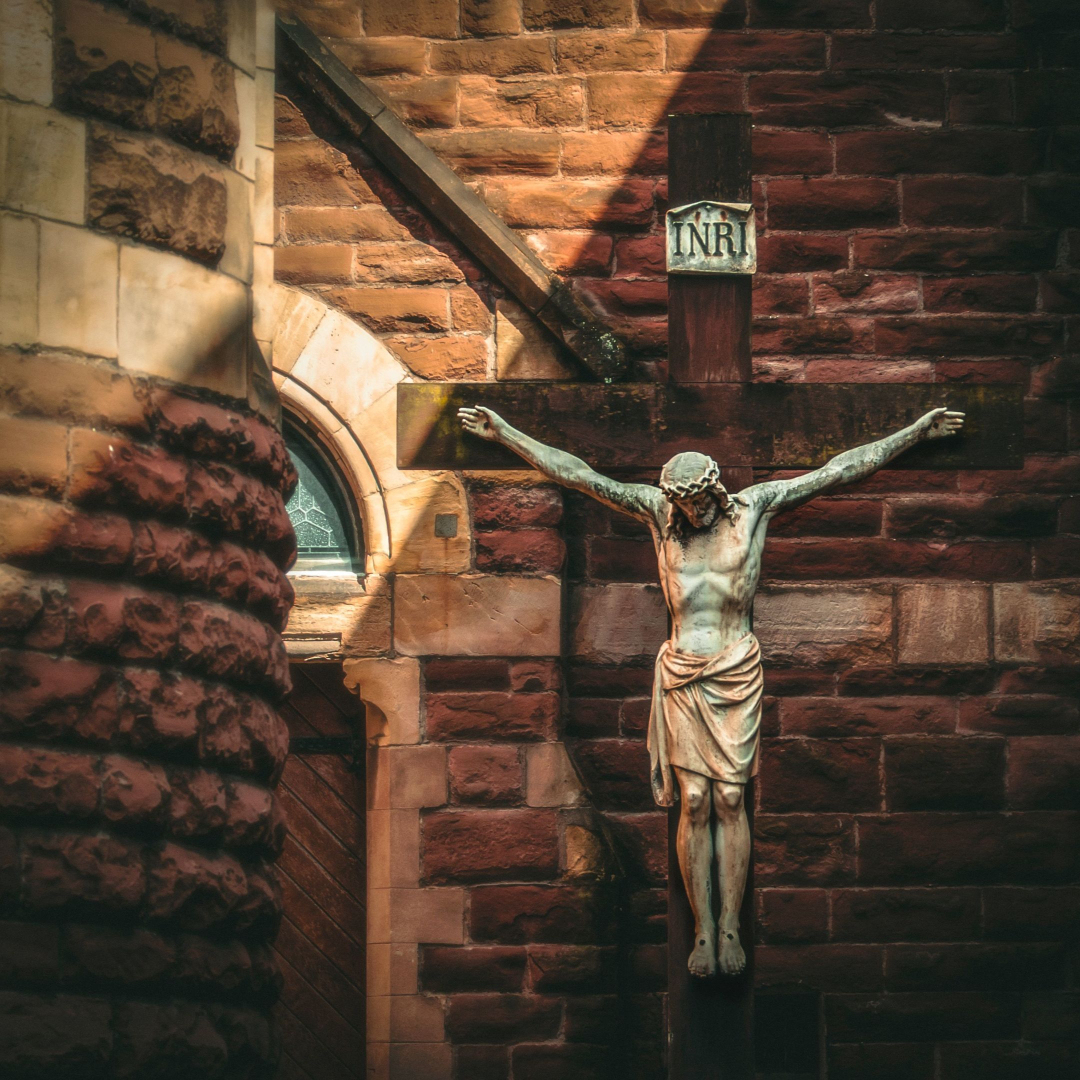
🕹️ Just finished Homeworld: Cataclysm (AKA Homeworld: Emergence) and I absolutely loved it. What a game! A different emotional experience than the original Homeworld to be sure, but a very fun ride.
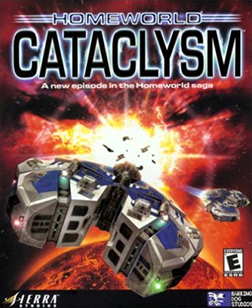
Was sad to hear of the passing of Kevin Conroy. He has been the voice of one my favorite heroes, Batman, for as long as I have engaged with animated and video game versions of the character. When I read Batman comics, I hear Kevin Conroy’s voice in my head!

Clip of a song I wrote for my daughter, Selah.
Currently reading: Why We Sleep by Matthew Walker 📚
Without just works, our worship can't be true
Both right worship and good works are vital, but without just works accompanying it, our worship cannot be true.
Listen to what the Lord said through Isaiah:
““What to me is the multitude of your sacrifices? says the LORD; I have had enough… Bring no more vain offerings; incense is an abomination to me. New moon and Sabbath and the calling of convocations— I cannot endure iniquity and solemn assembly. Your new moons and your appointed feasts my soul hates; they have become a burden to me; I am weary of bearing them.” (Isaiah 1:11–14, ESV)
The problem wasn’t with the offerings themselves, it was that they were vain offerings. That is, they meant nothing to the people offering them because there was no genuine repentance or turning away from evil. The problem here is the hypocrisy of blatant iniquity, and the attempt to cover it over with solemn assemblies.
So, God says,
“When you spread out your hands, I will hide my eyes from you; even though you make many prayers, I will not listen; your hands are full of blood.” (Isaiah 1:15, ESV)
We can’t cover our selfish, self-destructive attitudes, actions, and affections with ritual, ceremony, or even creeds. Saying the right things, and knowing the right things are not the same thing as truly believing the word of God. Truly believing the word of God is always worked out into actions that reflect the character of God as good, compassionate, just, and merciful.
This is the first thing that God desires to please him. Right worship and ceremony can support and reflect a life lived in imitation of God, but to quench the Spirit’s leading toward this in the liturgy is nothing less than a rebellion against the living God.
Sisters and brothers, we will not win that fight.
“…the Lord Jesus…[will be] revealed from heaven with his mighty angels in flaming fire, inflicting vengeance on those who do not know God and on those who do not obey the gospel of our Lord Jesus. They will suffer the punishment of eternal destruction, away from the presence of the Lord and from the glory of his might,” (2 Thessalonians 1:7–9, ESV)
Evil will be cast out of existence, and if we keep holding on to evil, we will also experience the punishment of that purifying fire.
On our own, we have an inevitable tendency to hold on to evil. To return again to our sinful, selfish, self-destructive ways. Yet God in his mercy sent his Son to forgive us of our sins, to heal us from its effects, to set us free to orient our lives toward justice and life. ““Come now, let us reason together, says the LORD: though your sins are like scarlet, they shall be as white as snow; though they are red like crimson, they shall become like wool.” (Isaiah 1:18, ESV)
This is confirmed in a Gospel passage from Luke 19. This is the wonderful story of Zacchaeus the cheating tax collector who, upon encountering Jesus, does a complete 180. He turns from his sin and makes everything right, going above and beyond as he restored all he owed to those he cheated.
“…Jesus said to him, “Today salvation has come to this house, since he also is a son of Abraham. For the Son of Man came to seek and to save the lost.”” (Luke 19:9–10, ESV)
Notice the salvation here isn’t being swept out of this world, but rather things being as they should be in this world.
This is what is possible in the present as we trust that Jesus’ is indeed the pattern for all humanity. This what we are saved into when we receive the forgiveness of our own sins that Jesus offered on the cross, even has as he was unjustly murdered. This is how we are freed to live as we receive the same Holy Spirit that raised Jesus from dead.
It’s this experience of forgiveness and real change of heart and life that confirms the promised hope that this work of the renewal of all things has only just begun, and will indeed be completed when Jesus comes again.
It is the grace of God in Christ that makes it possible for us to “cease to do evil, learn to do good; seek justice, correct oppression; bring justice to the fatherless, [and] plead the widow’s cause.” (Isaiah 1:16–17, ESV).
4 parts of making peace with discernment
I think the church today would do well to emulate these practices that are evident from the Jerusalem Council in Acts 15:
-
Entering a process of discernment that includes debate, remembering core doctrine, and careful listening
-
Judgment made and articulated in light of Gospel experience and Scriptures by an authorized and trusted representative of the church.
-
Compromise for the sake of relational and public unity.
-
Clear communication not only in a published statement, but via relational face-to-face interactions
My next “laptop” will probably be a Galaxy Tab S8.
I’ve been using my 2019 Galaxy Tab A 10.1 for some actual work lately and I’m surprised that it actually performs satisfactorily.
No, it’s not a fluid as my Windows laptop, especially when it comes to file management, but the trade-off for portability and battery life are compelling…
Ordained a priest 7 years ago today. So grateful to God and to those that he has called me to serve. I’m especially thankful for my wife, Amber, who is a constant support, source of wisdom, and inspiration to me as she serves faithfully in her own ministries.
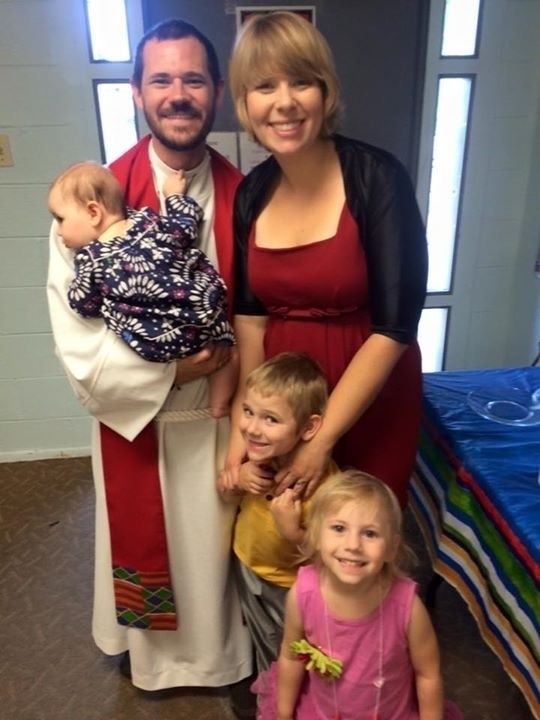
Practice what you pray
Prayer is what grounded and energized Jesus' life of action for the sake of the world.
Jesus practiced what he preached and what he prayed.
He was faithful in prayer; we read about it throughout the Gospels.
He also took action as he healed the sick, threw out the dishonest money changers from the temple, restored dignity to prostitutes, elevated the value of children, and even stood against the death penalty for an adulterous woman.
Almost every time, someone was there to critique Jesus harshly, even as he was modeling and working true justice in the world. But St. Peter says,
“When he was reviled, he did not revile in return; when he suffered, he did not threaten, but continued entrusting himself to him who judges justly.” (1 Peter 2:23, ESV)
When we follow the story of Jesus closely, we realize the world has no shortage of unjust judges. We realize so often we are the unjust judges, trying to justify our own selfish and destructive attitudes, actions, and affections, regardless what that means for ourselves or those around us.
Jesus entrusted himself to Justice, to God, as he submitted even to the unjust judgement of sinful and selfish human beings, giving his very life on a Roman cross.
Yet as we were wrongly proclaiming him guilty, he was freely forgiving every sin. As we were condemning him to death, he was taking death itself with him to the grave.
His love was so great, that it endured the greatest injustice imaginable, and began to bend the universe back into the shape it should be. He rose from the dead in vindication that love and forgiveness and mercy triumph over judgement.
In this, he accomplished true justice. Not in the sense that everyone gets what they deserve—if that was the case no one could be saved, because we all truly deserve to be judged and condemned by our sins.
But Jesus accomplishes justice in the sense that he is setting things right in the world, robbing death of its power, and replacing it with the certain hope of renewal of all things as sheer gift of undeserved grace from God.
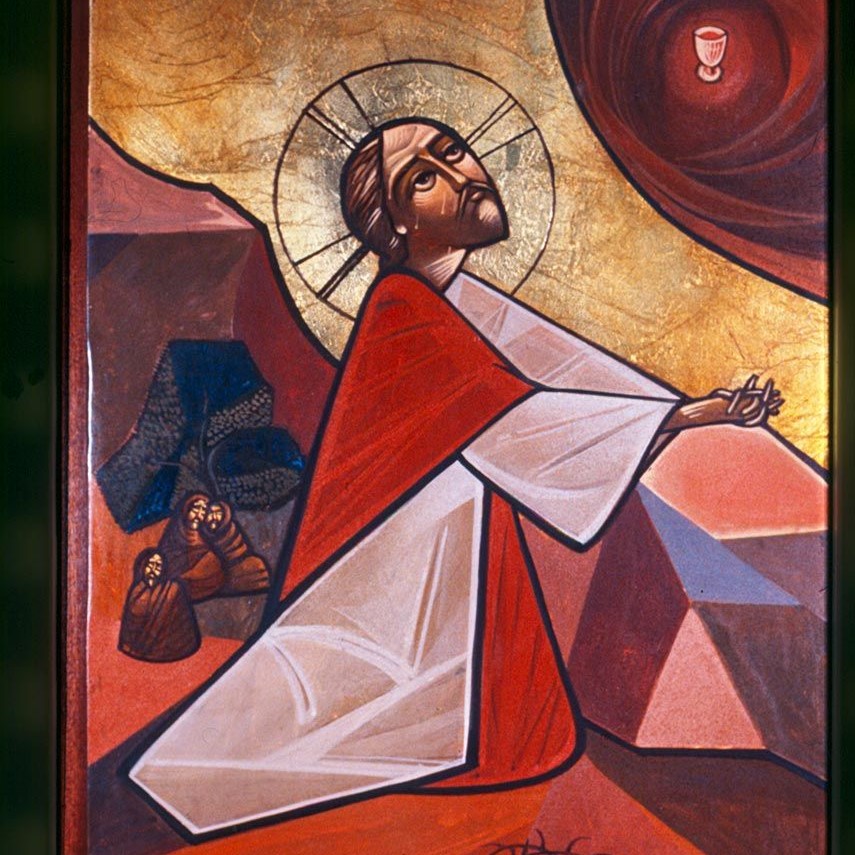
 NRH
NRH